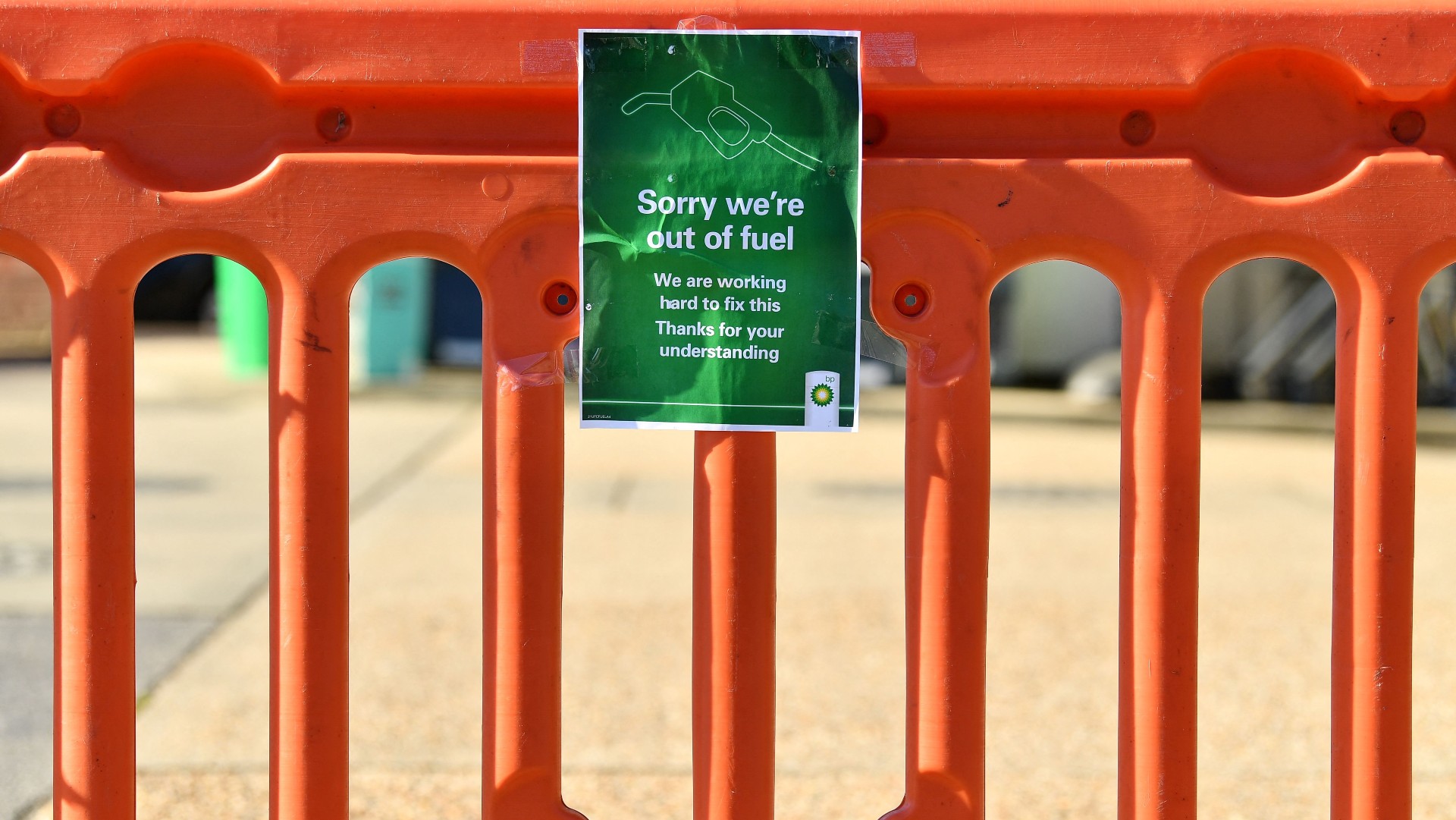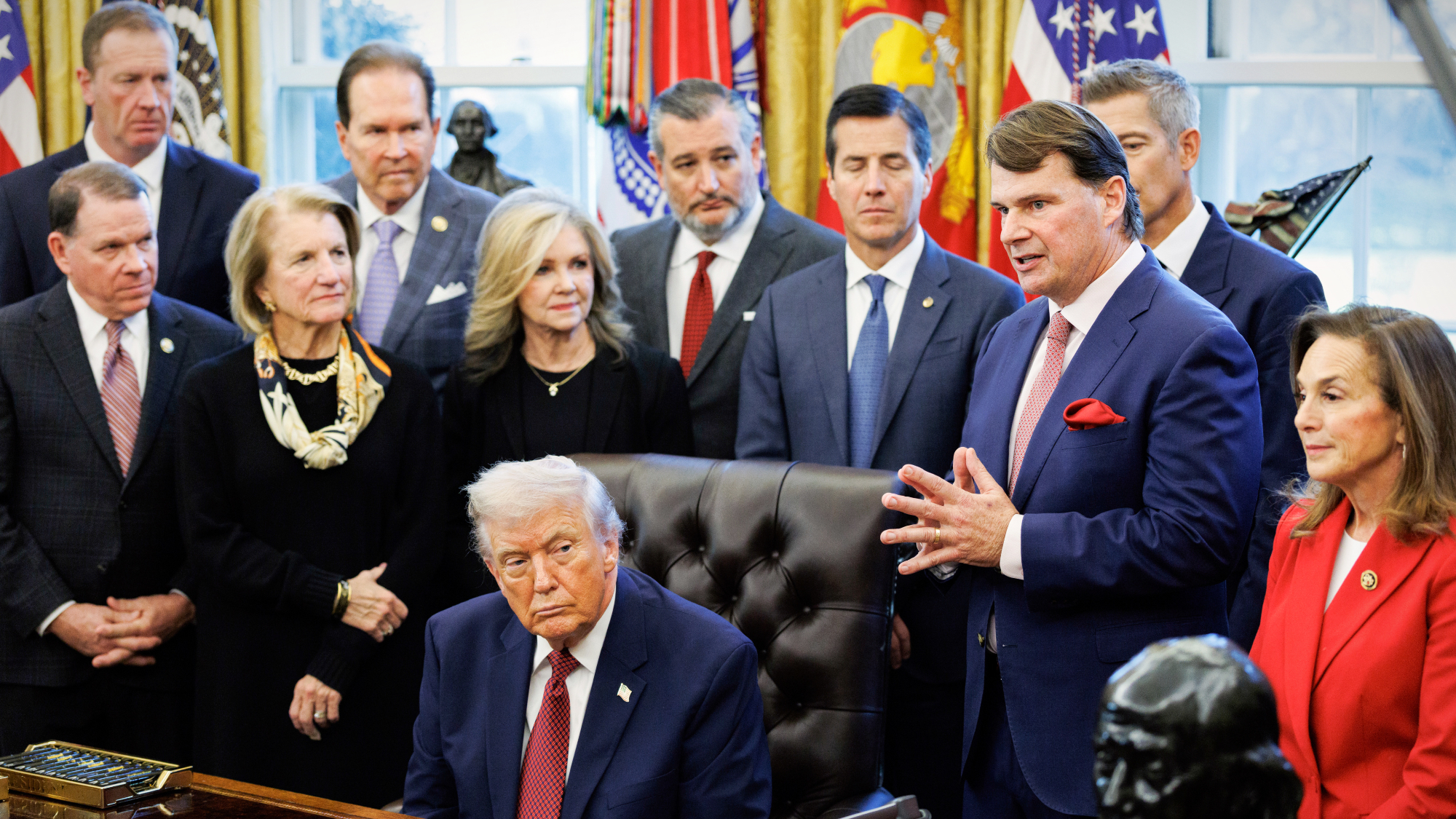What the world is saying about the UK’s fuel crisis
Britons facing re-run of 1970s shortages but ‘there is nothing Austin Powers-like about this time machine’

A free daily email with the biggest news stories of the day – and the best features from TheWeek.com
You are now subscribed
Your newsletter sign-up was successful
As Downing Street tries to extinguish panic over the UK’s fuel crisis, other countries are watching incredulously.
Following days of queues at petrol pumps and reports of fights on garage forecourts, Boris Johnson has insisted that “we are starting to see the situation improve” and has urged Britons to “go about their business in the normal way”.
But the prime minister’s intervention hasn’t stopped the rest of world queueing up “to mock Britain” over the shortages, said The Times.
The Week
Escape your echo chamber. Get the facts behind the news, plus analysis from multiple perspectives.

Sign up for The Week's Free Newsletters
From our morning news briefing to a weekly Good News Newsletter, get the best of The Week delivered directly to your inbox.
From our morning news briefing to a weekly Good News Newsletter, get the best of The Week delivered directly to your inbox.
Pro-Kremlin Russian television channel NTV, owned by energy giant Gazprom, is among those ridiculing “panic-ridden” Britain, reported the Daily Mail.
“The few petrol stations that still have fuel are under siege as car owners are ready to fight for their lives for every litre of fuel,” declared one NTV presenter “Queues at petrol stations are like sausage shortages in the Soviet Union.”
Viewers were told that “it’s pretty obvious the island’s authorities have no clear rescue plan”.
Another Russian channel showed footage of a man with a knife at a petrol station, with the presenter declaring: “Englishmen have firmly learned the new phrase, the Petrol War. Fights at petrol stations, people are resorting to knives.”
A free daily email with the biggest news stories of the day – and the best features from TheWeek.com
Australia’s 9News also broadcast scenes of fighting on the forecourts amid honking horns. “What’s being fuelled... is rage,” said the news anchor. “Across the UK, tensions are boiling over in battles at the bowser.”
Other countries that have also endured months of fuel shortages “have been watching events in Britain with a mixture of disbelief and deja vu”, said The Times.
Haitian news website Clin D’oeil pointed out that “the English are having to do what the Haitians do”. Lebanese journalist Rima Maktabi tweeted a video of cars queueing, along with the message: “This is #London at midnight, not #Beirut nor #Tehran where people queue for fuel!”
For the EU, meanwhile, “the fuel crisis, like the empty supermarket shelves, is a direct consequence of the UK’s departure from the bloc”, wrote Brussels-based journalist Leo Cendrowicz for the i news site.
Edwin Atema, from the Federation of Netherlands Trade Unions (FNV), “pithily summed up” why no one across the Channel is “in any rush to dig Britain out” of the crisis, said Cendrowicz.
“The EU workers we speak to will not go to the UK for a short-term visa to help the UK out of the shit they created themselves,” Atema told BBC Radio 4’s Today programme on Monday.
Meanwhile, France’s European Affairs Minister Clement Beaune told France 2 television that “every day, we see the intellectual fraud that was Brexit”.
Germany’s SPD leader Olaf Scholz had a similar take on events. Speaking on Monday after his party won the most seats in the country's federal election, Scholz said: “We can’t send German truckers to the UK to help solve the crisis. We worked very hard to convince the British not to leave the union. Now they decided different and I hope they will manage the problems coming from that.”
Brexit has “aggravated the labour shortages”, agreed The New York Times, but the UK faces a “confluence of problems”, with the other main aggravator being coronavirus.
“Britons have emerged from 18 months of pandemic-imposed hibernation to find their country has many of the same afflictions it had during the 1970s,” said the paper. But “there is nothing Austin Powers-like about this time machine: Unlike the Swinging Sixties, the Seventies were, by all accounts, some of the bleakest days in postwar Britain”.
The Washington Post’s London-based reporter Jennifer Hassan has offered a personal account of some of the hardships being faced in present-day Britain.
The labour crisis had already “sparked shortages of milkshakes, chicken and fizzy drinks - and even wiped some beers and traditional pork pies off pub menus”, she wrote. And then the “petrol panic began”.
Hassan described her unsuccessful attempts to fill up her car at more than half a dozen petrol stations, and told how a tank delivery driver claimed that motorists had been “following him down the highway like ducklings”, to see where he was heading.
“To my surprise, the fuel crisis has even made its way onto dating apps,” Hassan told US readers. “‘Single. Comes with a full tank of petrol,’ read one guy’s profile. How could I resist?”
-
 Palantir's growing influence in the British state
Palantir's growing influence in the British stateThe Explainer Despite winning a £240m MoD contract, the tech company’s links to Peter Mandelson and the UK’s over-reliance on US tech have caused widespread concern
-
 Quiz of The Week: 7 – 13 February
Quiz of The Week: 7 – 13 FebruaryQuiz Have you been paying attention to The Week’s news?
-
 Nordic combined: the Winter Olympics sport that bars women
Nordic combined: the Winter Olympics sport that bars womenIn The Spotlight Female athletes excluded from participation in demanding double-discipline events at Milano-Cortina
-
 How corrupt is the UK?
How corrupt is the UK?The Explainer Decline in standards ‘risks becoming a defining feature of our political culture’ as Britain falls to lowest ever score on global index
-
 The high street: Britain’s next political battleground?
The high street: Britain’s next political battleground?In the Spotlight Mass closure of shops and influx of organised crime are fuelling voter anger, and offer an opening for Reform UK
-
 Biggest political break-ups and make-ups of 2025
Biggest political break-ups and make-ups of 2025The Explainer From Trump and Musk to the UK and the EU, Christmas wouldn’t be Christmas without a round-up of the year’s relationship drama
-
 ‘The menu’s other highlights smack of the surreal’
‘The menu’s other highlights smack of the surreal’Instant Opinion Opinion, comment and editorials of the day
-
 Trump boosts gas cars in fuel economy rollback
Trump boosts gas cars in fuel economy rollbackspeed read Watering down fuel efficiency standards is another blow to former President Biden’s effort to boost electric vehicles
-
 Is a Reform-Tory pact becoming more likely?
Is a Reform-Tory pact becoming more likely?Today’s Big Question Nigel Farage’s party is ahead in the polls but still falls well short of a Commons majority, while Conservatives are still losing MPs to Reform
-
 Taking the low road: why the SNP is still standing strong
Taking the low road: why the SNP is still standing strongTalking Point Party is on track for a fifth consecutive victory in May’s Holyrood election, despite controversies and plummeting support
-
 Is Britain turning into ‘Trump’s America’?
Is Britain turning into ‘Trump’s America’?Today’s Big Question Direction of UK politics reflects influence and funding from across the pond